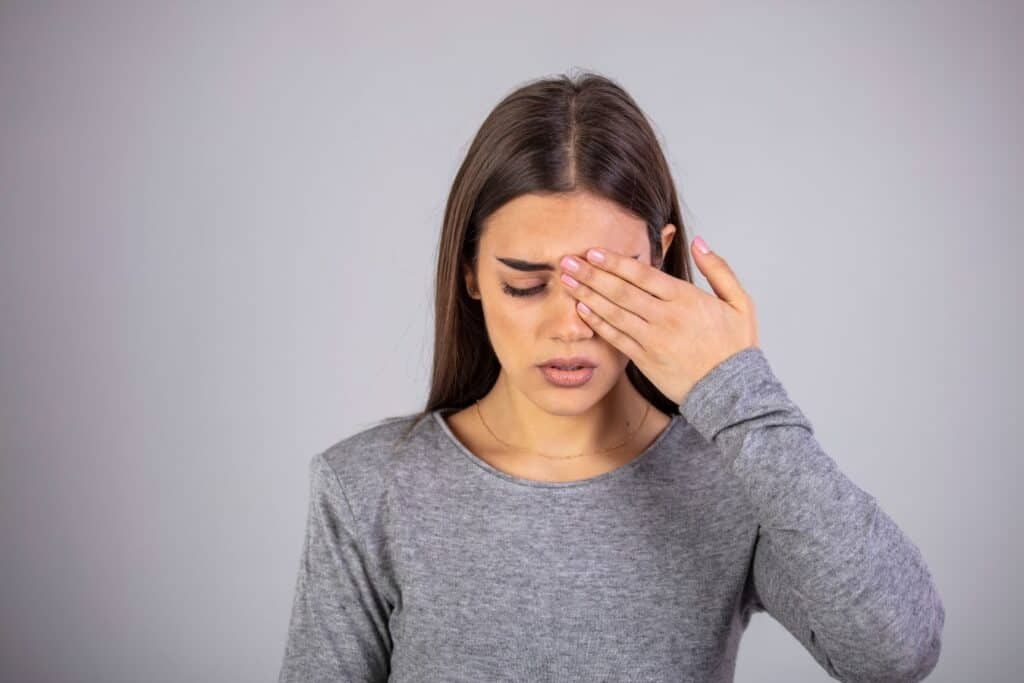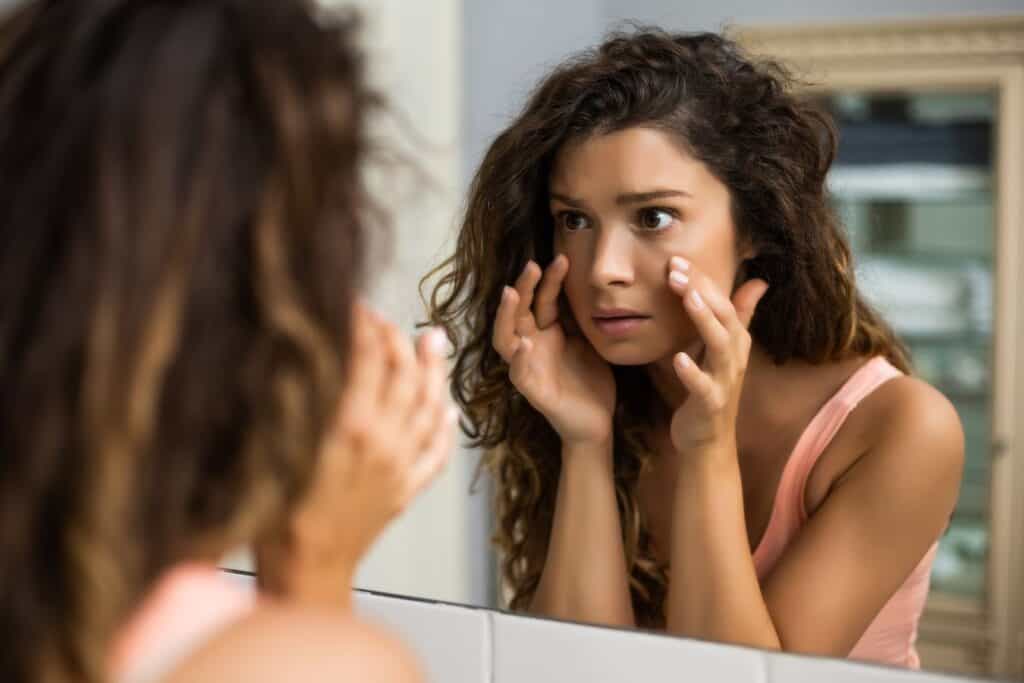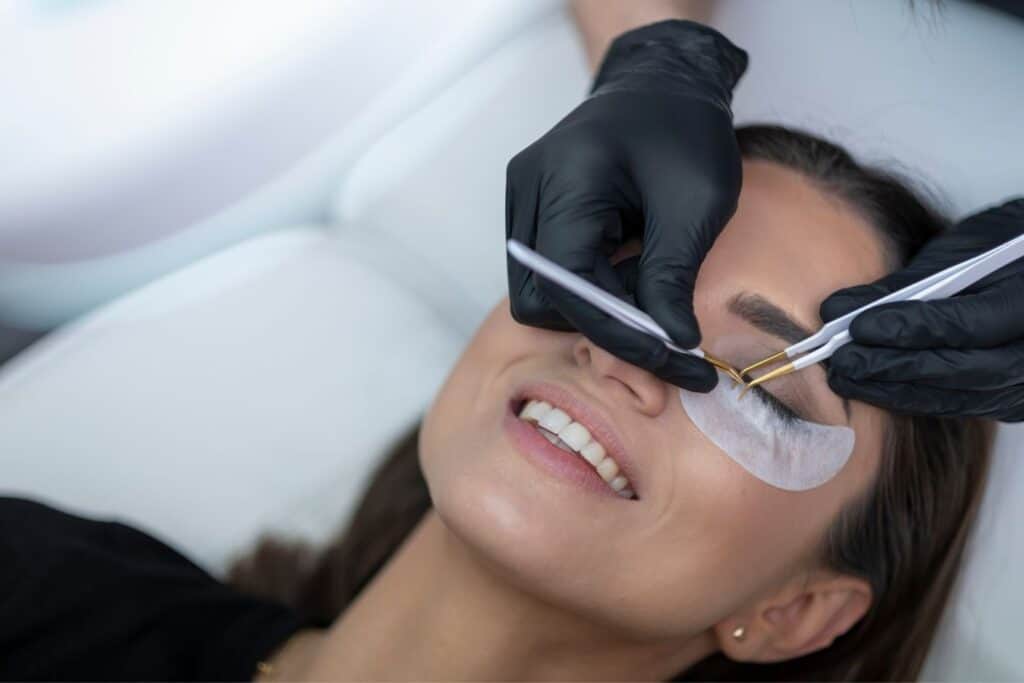If your eyes and lash extensions are feeling a little itchy, you may be wondering if anything is wrong. This article will explain why your eyelash extensions might be itchy, and what to do about it.

Eyelash extensions might feel itchy because you got a small amount of fumes from the adhesive in your eyes during the application of your extensions. Alternatively, and more seriously, you could be having an allergic reaction to the glue used in this process.
Why Are Your Eyelash Extensions Itchy?
Here are the most common reasons why your eyes may feel itchy after getting lash extensions:
1. The adhesive got into your eyes
We detail more about how the adhesive of your extensions might result in your fake lashes feeling itchy, but you should also know that exposure to the fumes and vapors from the adhesive may cause some sensitivity and itchiness.
If your eyes weren’t fully closed during your appointment, you may have got some of this vapor trapped in your eyes.
This could cause swelling, redness, or itchiness in the period following the appointment.
2. Poorly customized lashes
If you go for a slightly cheaper salon or technician, they may not customize the extensions to suit your eyes.
You may feel that your extensions are too long, and are poking into your eyes or the delicate skin around your eyes.
3. Improper cleaning
If you don’t take proper care of your extensions after their application, then you may find that they become irritated and itchy.
You always need to thoroughly cleanse your extensions at the end of every day, so as to remove the build-up of residue and any make-up you may be wearing.
Falling asleep with the day’s dirt and debris, as well as make-up particles, may cause itchiness in your eyes and around your lashes, and is a bad habit to get into.
Take care to use a specially formulated eyelash extensions cleanser at the end of every day so as to cleanse your lashes.
Brush them out once dry with a clean mascara wand or spoolie.
You should avoid the use of oil-based products around your extensions, too, as the oil will dissolve the adhesive and may result in premature shedding of your extensions.
4. Tugging or pulling
If you’re picking at your lashes, then you’re going to be causing chaos.
Firstly, you’ll transfer the oils from your fingers onto your lash extensions, which may interact badly with the adhesive.
Next, you’ll likely cause the extensions to fall out sooner than intended, as the friction from your tugging or pulling will loosen them and promote premature shedding.
Leave your extensions alone. If you are rubbing your eyes because they are itchy, you will need to evaluate why you think your lashes are irritated and take the necessary steps to reduce the itchiness.
How To Tell If You Are Having An Allergic Reaction To Fake Lashes

Some people may feel that their fake lashes are itchy because they’re having an allergic reaction.
This section of the article will help you gauge whether the itchiness you’re feeling in your fake lashes may be because of an allergic reaction, and what to do if you think this is the case.
Symptoms of Allergic Reaction To Fake Lashes
You might experience symptoms of an allergic reaction to fake lashes immediately after their application, or a few hours following – there’s no hard and fast rule.
Symptoms typically include:
- Itchiness
- Swelling
- Excess tearing of the eyes
- Clumping or sticky eyes
- Redness.
This can be either on the eyelid or in the eye itself. It can occur on one eye, or on both.
You could be experiencing an allergic reaction to the fake lashes as a result of two main causes: Blephatiris or you’re allergic to the adhesive.
Blepharitis
You could have contracted blepharitis, a relatively unknown eye condition that has been associated with the application of eyelash extensions.
Allergic Reaction To The Adhesive
The main cause of an allergic reaction to fake lashes is likely because you are allergic to the adhesive that has been used.
Unfortunately, some of the glue used for eyelash extensions can contain formaldehyde. Formaldehyde is an intense chemical, and it may cause some individuals to have an allergic reaction.
This may come from exposure to the gas and vapor released by formaldehyde, or from products that contain the chemical.
Typically, an allergy to formaldehyde will present itself in a burning and stinging sensation in the eyes, nose, and throat.
You may also suffer from keratoconjunctivitis, an inflammation of the eye’s cornea and conjunctiva.
This is particularly the case for people who are allergic to formaldehyde in the adhesive of eyelash extensions, as your eyes will be most vulnerable to the toxic chemical.
Other symptoms can include chest tightness and difficulty breathing, as well as headaches and fatigue.
Treatment
You can typically treat an allergic reaction to eyelash extensions at home.
The allergic reaction may last anywhere from a few hours to a few days. Remember to avoid rubbing the eyes, as this will only exacerbate the problem.
Use at-home remedies like the below to try and treat the allergy. If these do not work, you will need to seek medical assistance:
- Antihistamines
- Cold compresses
- Eye drops
- Hydrocortisone cream
You should also return to your lash technician and have your extensions removed. Do not try to do this at home, as you may only end up inflaming the area further.
A professional will be better able to thoroughly remove the adhesive from your natural lashes.
Prevention
You should always ask your lash technician to clarify what your extension adhesive is made up of. If formaldehyde is a key ingredient, you may want to think twice about having the glue used so close to your eyes.
A key way to test whether or not you’re allergic to formaldehyde is by performing a patch test.
Apply a small amount of the adhesive on a soft area of skin such as your inner elbow, and leave it for 24 hours. If you experience a reaction, then you likely have a high sensitivity to formaldehyde.
It’s always worth heading to a reputable salon and a high-quality lash technician in order to ensure that you’re receiving the best possible treatment.
The use of unclean or unsanitary equipment will only increase the risk of an allergic reaction.
If you experience conditions like alopecia or thyroid issues, have been receiving either radiation or chemotherapy, and are on medication, then you should always consult with a physician prior to booking eyelash extensions.
How To Prevent Fake Lashes From Becoming Itchy

Close your eyes!
Ensuring that your eyes are fully closed during the application is one of the best ways to prevent the fumes from your adhesive from causing irritation and itchiness in your eyes.
It’s a simple preventative step, but it will most likely make a serious difference.
Go to a reputable salon
During your appointment, your technician should follow the best possible procedure to keep your eyes and the delicate skin around them as safe and happy as possible.
Ideally, the room should be well ventilated, so that any fumes from the adhesive don’t build up.
The technician should check whether you’re prone to allergic reactions to any of the ingredients in the adhesive.
Natural lashes should be thoroughly cleaned before your extensions are added, and dried, too. Your extensions should also be customized to your face shape so that they aren’t likely to cause irritation or itchiness.
Proper post-application care
Once your technician has done their best to get your lashes looking beautiful, it’s up to you to care for them properly.
Always use appropriate, specially formulated lash cleanser to regularly clean your extensions.
Only ever use oil-free formulas around your eyes and eyelids, and avoid being too aggressive or rubbing too much when removing make-up and other particles from your lashes.
Patch test
As described above, you can gauge whether or not you’re prone to a formaldehyde allergy by patch testing your skin.
Doing this before heading to an appointment will mean that you can get your extensions applied with confidence.
Always let your technician know if you are prone to allergies, as they can use glue that won’t set you off.
Frequently Asked Questions (FAQ)
Eyelash extensions shouldn’t itch, but if they do, it may just be because you didn’t have your eyes closed during the application, and some of the vapor from the adhesive entered and irritated your eyes.
You should wash your extensions at the end of every day in order to remove any make-up and build-up from the day. Use a specially formulated cleanser and take care to be gentle during the process.
